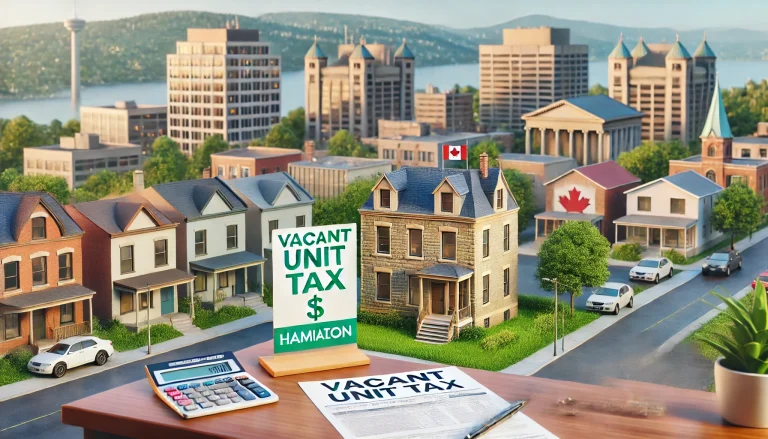Are you planning to buy a home in Ontario and wondering what the hidden costs might be? One of the most significant yet often overlooked expenses is the land transfer tax. Whether you’re a first-time buyer or a seasoned investor, understanding how this tax is calculated, who pays it, and whether you qualify for a rebate can help you plan better financially.
In 2025, Ontario continues to follow a tiered tax structure for property transfers, and the rules vary based on location, especially in cities like Toronto, where a municipal land transfer tax is also levied.
This guide provides everything you need to know about the land transfer tax in Ontario, including current rates, exemptions, rebates, and how to calculate your costs before signing on the dotted line. Let’s break down this crucial part of buying property in the province.
What Is Land Transfer Tax?
When you purchase a property in Ontario, you’re required to pay a land transfer tax at the time of closing. This tax is levied by the provincial government and, in certain municipalities like Toronto, a municipal land transfer tax may also apply. The tax is typically calculated as a percentage of the property’s purchase price.
Understanding the land transfer tax is essential for several reasons. It significantly impacts your total closing costs, and in many cases, must be paid upfront, which can surprise buyers who haven’t accounted for it.
Here’s why it matters:
- It’s a mandatory cost for almost every buyer in Ontario.
- It applies to all types of real estate purchases, including homes and condos.
- In most cases, you can’t avoid it unless you’re eligible for a rebate or exemption.
- If you’re buying in Toronto, you’ll need to pay both provincial and municipal land transfer taxes.
Buyers should be aware that the land transfer tax can amount to thousands of dollars, depending on the purchase price. Knowing how it works helps you budget better and avoid last-minute financial stress. The more informed you are, the smoother your home-buying experience will be.
How Much Is Land Transfer Tax in Ontario in 2025?

When buying property in Ontario, the land transfer tax is calculated using marginal tax rates, which apply to different brackets of the property’s value. This means different portions of the purchase price are taxed at increasing rates.
What Are the Current Land Transfer Tax Rates in Ontario?
As of 2025, Ontario’s provincial land transfer tax rates are as follows:
- 0.5% on the first $55,000 of the property value
- 1.0% on amounts from $55,000.01 to $250,000
- 1.5% on amounts from $250,000.01 to $400,000
- 2.0% on amounts from $400,000.01 to $2,000,000
- 2.5% on amounts above $2,000,000 for residential properties with one or two single-family residences
These rates are cumulative, meaning the percentage increases as the property value increases. It’s not a flat rate across the entire value.
How is Land Transfer Tax Calculated Based on Purchase Price?
To calculate the tax, you apply each marginal rate to the portion of the purchase price that falls within its corresponding bracket. This is similar to how income tax brackets work.
Let’s consider a $300,000 home:
- First $55,000 × 0.5% = $275
- Next $195,000 (from $55,000 to $250,000) × 1.0% = $1,950
- Remaining $50,000 (from $250,000 to $300,000) × 1.5% = $750
- Total land transfer tax = $275 + $1,950 + $750 = $2,975
Table: Land Transfer Tax Rates Breakdown (2025)
| Purchase Price Range | Marginal Tax Rate |
| Up to $55,000 | 0.5% |
| $55,000.01 to $250,000 | 1.0% |
| $250,000.01 to $400,000 | 1.5% |
| $400,000.01 to $2,000,000 | 2.0% |
| Over $2,000,000 (1-2 unit residences) | 2.5% |
The rates can significantly impact your overall purchase cost, so it’s important to calculate early in your home-buying process. Buyers in certain cities may face higher costs due to local taxes, which we’ll explore next.
Who Pays the Land Transfer Tax in Ontario?

In Ontario, you, the buyer, are responsible for paying the land transfer tax. This cost is due at the time of registration of the property with the land title office, and it cannot be rolled into your mortgage. The seller does not pay any portion of this tax.
Here’s what you should know:
- The buyer always pays the land transfer tax.
- It is applicable regardless of whether the purchase is of a house, condo, or vacant land.
- If you’re buying in Toronto, you’ll need to account for both provincial and municipal land transfer taxes.
- The tax is typically paid in full at closing, so ensure your closing costs budget includes this.
While most people must pay this tax, there are certain exemptions available. These are often tied to specific situations like transfers between spouses or from parents to children, but they are quite limited and must be verified legally. Failing to budget for this can delay your closing or lead to unexpected financial burdens.
Is There a Municipal Land Transfer Tax in Toronto?
Yes, if you’re buying property in the City of Toronto, you are subject to an additional municipal land transfer tax on top of the provincial one. This tax uses the same rate structure as the provincial LTT, effectively doubling your total tax burden.
Here’s what you should know:
- The municipal LTT applies only within the City of Toronto boundaries.
- Buyers in nearby areas like Mississauga, Vaughan, or Markham do not pay this tax.
- The rates mirror the provincial rates, which means if your property is in Toronto, you pay both sets of rates.
For luxury properties priced above $3 million, an expanded set of tax rates now applies.
Toronto introduced new brackets in 2024 for high-end real estate:
| Home Value Range (Toronto) | Municipal Land Transfer Tax Rate |
| $3,000,000 to $4,000,000 | 3.5% |
| $4,000,001 to $5,000,000 | 4.5% |
| $5,000,001 to $10,000,000 | 5.5% |
| $10,000,001 to $20,000,000 | 6.5% |
| Over $20,000,000 | 7.5% |
The provincial tax is also paid on top of this, which means luxury buyers in Toronto can face massive land transfer tax bills. This is a crucial cost to include in your financial planning if buying within city limits.
How Does the Land Transfer Tax Rebate Work in Ontario?

If you’re a first-time home buyer, Ontario offers a generous rebate program that can save you up to $4,000 on your land transfer tax. This rebate is designed to ease the financial burden for those entering the housing market for the first time.
Who Qualifies for the Land Transfer Tax Rebate?
To qualify, you must meet the following conditions:
- Be 18 years or older
- Be a Canadian citizen or permanent resident
- Occupy the home as your primary residence within 9 months
- Have never owned a home or interest in a home, anywhere in the world
- Your spouse must also have never owned a home while being your spouse
- If buying a newly built home, it must be covered under Tarion Warranty
- You must apply for the rebate within 18 months of registration
How Much Can First-time Buyers Save?
The maximum rebate is $4,000, which fully covers land transfer tax on homes priced up to $368,000. For homes priced above this, you’ll receive the $4,000 and pay the remainder. You can claim the rebate at the time of registration to reduce your upfront costs. If not claimed, then you can apply for a refund later.
Table: Rebate Examples by Home Price
| Purchase Price | LTT Payable | Rebate | Net Payable |
| $100,000 | $725 | $725 | $0 |
| $250,000 | $2,225 | $2,225 | $0 |
| $368,000 | $4,000 | $4,000 | $0 |
| $400,000 | $4,475 | $4,000 | $475 |
| $600,000 | $8,475 | $4,000 | $4,475 |
This rebate can significantly reduce your upfront costs, so first-time buyers should check eligibility and apply accordingly.
Can You Avoid Paying Land Transfer Tax?

While most buyers in Ontario must pay the land transfer tax, there are a few legal exemptions available in specific cases. However, these are quite limited and must be proven with documentation.
You might avoid the tax if:
- You are transferring the property between spouses
- The property is transferred to a family business corporation
- It is a farm property being transferred between family members
- You are receiving a life lease interest from a charity or non-profit
These exemptions are not automatic. You’ll need to provide legal documentation and sometimes a signed affidavit to qualify. It’s recommended to consult a real estate lawyer or tax expert to explore your eligibility for an exemption.
How Can You Estimate Your Land Transfer Tax?
Estimating your land transfer tax in advance helps you avoid surprises during closing. There are several ways to do this accurately.
You’ll need the following:
- Purchase price of the property
- Location (to determine if municipal tax applies)
- First-time buyer status (to factor in rebates)
Use an Ontario land transfer tax calculator available on reputable financial or government websites. These tools break down the total tax payable and even include municipal tax if applicable.
Manual calculations can also be done using the marginal rate breakdown discussed earlier. Just apply each rate tier to the corresponding price bracket. This is especially useful during your home search, allowing you to plan a full closing cost budget.
What Other Costs Should You Budget When Buying a Home?

Land transfer tax is just one part of the closing cost puzzle.
Here are other expenses you should be ready for when buying a home in Ontario:
- Legal fees for hiring a real estate lawyer
- Title insurance and title search costs
- Home inspection fees
- Appraisal fees, if required by your lender
- Mortgage registration and discharge fees
- Property insurance setup
- Moving costs
These expenses can easily add up to 1.5% to 4% of the purchase price. Make sure to prepare a detailed closing cost budget alongside your mortgage planning. Being prepared financially helps reduce last-minute stress and supports a smooth transition into your new home.
Conclusion
Understanding how much is land transfer tax in Ontario in 2025 is vital for anyone planning to buy property in the province. From marginal tax brackets to municipal surcharges and first-time buyer rebates, every detail affects your bottom line.
While the tax may seem like just another fee, it represents a significant cost and should never be overlooked. By educating yourself and planning ahead, you’ll not only avoid surprises but also potentially save thousands of dollars.
Make sure to consult professionals where needed and use tools like calculators to prepare accurately.
FAQs
What is the land registration tax in Ontario?
It is a provincial tax charged when you buy a home and register it with Ontario’s land registry system.
Do newcomers or immigrants pay land transfer tax?
Yes, unless exempt or qualifying for rebates, all buyers, including newcomers, must pay the land transfer tax.
Are condos subject to the same land transfer tax?
Yes, condos are taxed using the same marginal rates as houses and other residential properties in Ontario.
How do I apply for a land transfer tax refund?
You can apply during registration or later by submitting the required documents to Ontario’s Ministry of Finance.
What happens if I don’t pay the land transfer tax on time?
You cannot complete your property registration without paying it, which could delay or cancel your transaction.
Is land transfer tax different for commercial properties?
Yes, different rules may apply, and rebates are generally not available for commercial real estate purchases.
Can I include land transfer tax in my mortgage?
No, it must be paid upfront during closing and cannot be financed through your mortgage loan.




